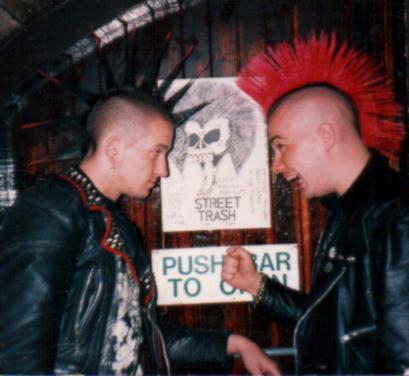
British punk rock was a cultural phenomenon that emerged in the mid-1970s as a reaction to the social and political climate of the time. It was a time of unemployment, economic recession, and political instability, and punk rock became a way for young people to express their frustration and anger at the world around them. The punk rock movement was a culmination of many different influences, from the DIY ethos of the early 1970s to the nihilism of the Sex Pistols and the anarcho-punk scene that emerged in the later years.
One of the most enduring legacies of British punk rock is its influence on fashion. The punk rock look was defined by safety pins, ripped clothing, and leather jackets, among other things. It was a style that was deliberately confrontational and designed to shock. It was also a way for young people to express their individuality and to reject the conformity of the mainstream. The punk rock look has continued to influence fashion to this day, with designers like Vivienne Westwood and Alexander McQueen drawing inspiration from the punk rock aesthetic.
Another legacy of British punk rock is its influence on music. Punk rock was a rejection of the bloated excesses of the 1970s rock scene, and it was characterized by its raw, stripped-down sound. Bands like the Sex Pistols, The Clash, and The Damned were known for their aggressive, high-energy music that rejected the notion of virtuosity. Punk rock was a call to arms for anyone who wanted to pick up an instrument and start a band, and it inspired countless musicians around the world to do just that.
Perhaps the most enduring legacy of British punk rock, however, is its DIY ethos. Punk rock was a movement that was defined by its self-sufficiency and its rejection of the corporate music industry. Bands would often release their own records, book their own shows, and create their own merchandise. This DIY ethos has continued to influence independent music scenes around the world, with countless bands and labels following in the footsteps of the punk rock pioneers.
Despite its many legacies, however, British punk rock was often misunderstood and maligned by the mainstream media. It was portrayed as a movement of nihilistic yobs who were only interested in causing chaos and destruction. But for those who were there, punk rock was about so much more than that. It was about expressing oneself, rejecting conformity, and forging a new path in a world that seemed intent on crushing the spirit of young people.
In conclusion, the legacy of British punk rock is one that is still felt today. Its influence can be seen in everything from fashion to music to the DIY ethos that continues to inspire independent artists around the world. But perhaps more than anything else, the legacy of British punk rock is one of resilience and defiance in the face of adversity. It was a movement that refused to be silenced, and its impact on the world of music and culture will be felt for generations to come.
Discover more from Anglotees
Subscribe to get the latest posts sent to your email.
